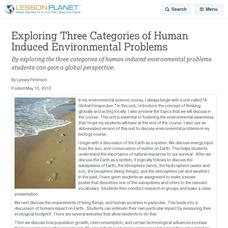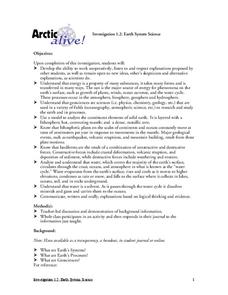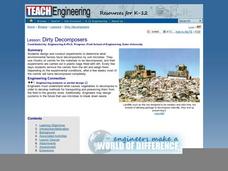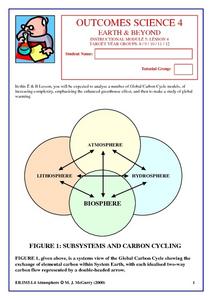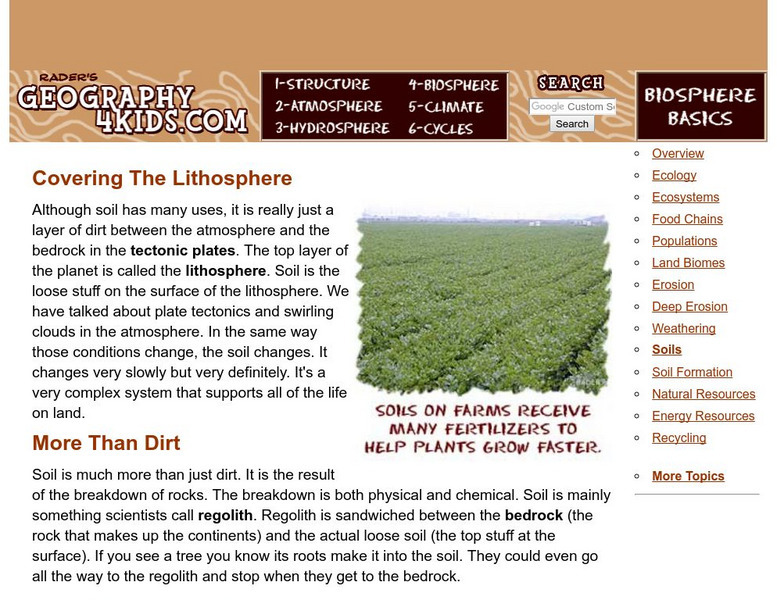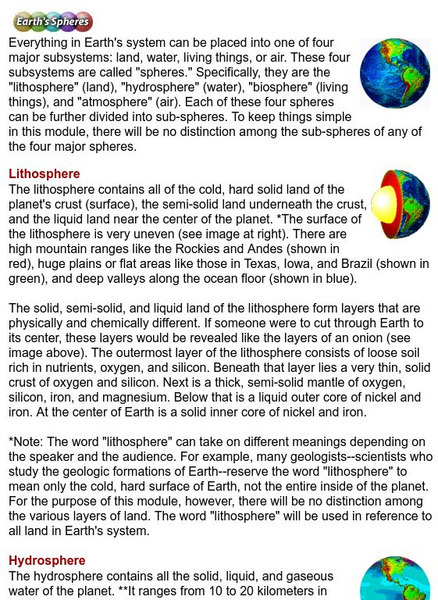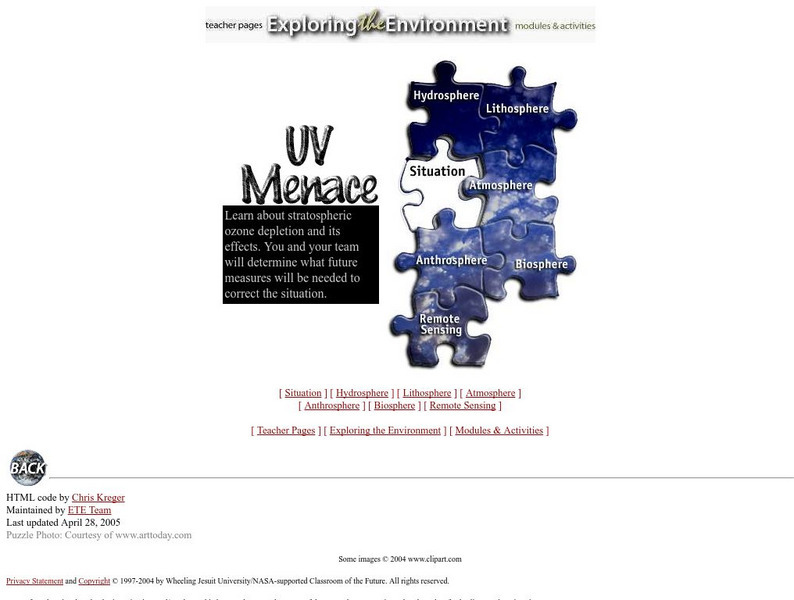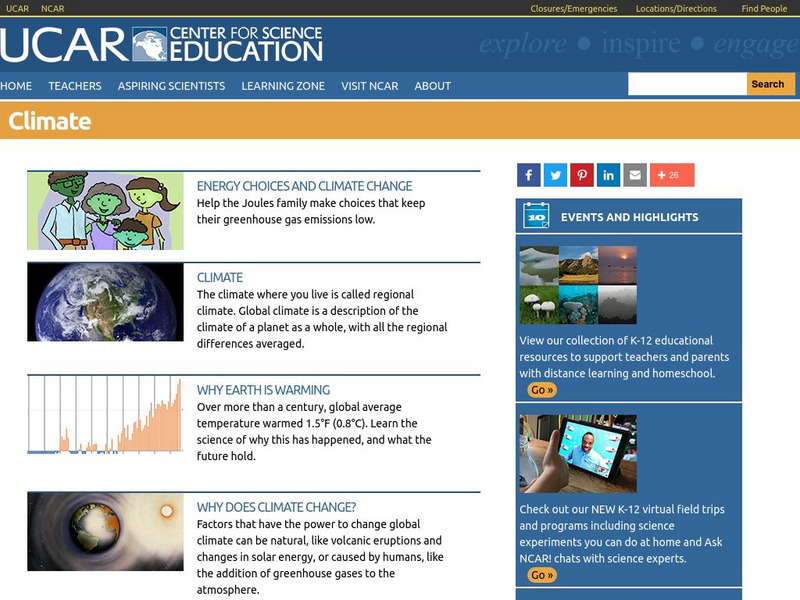Curated OER
Exploring Three Categories of Human Induced Environmental Problems
By exploring the three categories of human-induced environmental problems students can gain a global perspective.
Curated OER
Bryant Creek Watershed Project - Making a Karst Dictionary
Students explore the definitions relevant to Karst topography. They develop a Bryant Watershed Dictionary of the special words and terms that are used to talk about the topography and hydrology of the area they live in.
Curated OER
Making a Karst Dictionary
Students practice using the correct vocabulary in geology and hydrology. They use the Internet to research topics and practice their researching skills.
Curated OER
Land Associations
Learners identify and explore life forms of various biomes, define transitional regions, examine effects of abiotic and biotic interactions, research a biome, and produce newspaper that features environmental information. Lessons all on...
Curated OER
Earth System Science
Students explore the Earth and its ability to support life. They discuss the geosphere and the water cycle and complete the Water Wonders activity. After completing the activity, they respond in their journals and reflect upon the...
Alabama Learning Exchange
Researching Hurricanes with Technology
Young scholars explain the components that make up a hurricane.
Curated OER
Dirty Decomposers
Seventh graders design and conduct experiments to determine what environmental factors favor decomposition by soil microbes. They use chunks of carrot for the materials to be decomposed, and their experiments are carried out in plastic...
Curated OER
Earth's Layers Online Activity
In this Earth's layers worksheet, students click on the links in the questions about Earth's layers to find the answers to the questions and then come back and answer the questions. Students answer 12 questions total.
Curated OER
Global Warming – More or Less
Eighth graders identify the factors that contribute to global warming. In this earth science instructional activity, 8th graders evaluate the impact of global warming on the planet. They discuss their views within the group.
Curated OER
Outcomes Science 4: Earth & Beyond
In this earth and beyond science worksheet, students read through an 18 page packet containing information and questions pertaining to global carbon cycles. There are website links available on the pages where additional information on...
CK-12 Foundation
Ck 12: Life Science: 12.15 Biosphere
Understand Earth's biosphere which contains the lithosphere, hydrosphere, and atmosphere.
Geography 4 kids
Geography4 Kids: Biosphere: Soils
Get the full picture of what soil is offered by Geography4Kids.
US Geological Survey
U.s. Geological Survey: Volcanoes
Six-part interdisciplinary teaching packet. Through the story of the 1980 eruption of Mount St. Helens, students will answer fundamental questions about volcanoes. By learning about volcanoes, students will understand that the Earth...
Other
Interactions Between the Atmosphere & Hydrosphere [Pdf]
A discussion of the interactions between the four spheres of Earth and how they affect weather and climate. The slideshow is divided into two parts. The first deals with interactions between the atmosphere and the hydrosphere and the...
Center for Educational Technologies
Classroom of the Future: Earth Spheres
Everything in Earth's system can be placed into one of four major subsystems: land, water, living things, or air. These four subsystems are called "spheres." Specifically, they are the "lithosphere" (land), "hydrosphere" (water),...
TED Talks
Ted: Ted Ed: A Guide to the Energy of the Earth
Energy is neither created nor destroyed - and yet the global demand for it continues to increase. But where does energy come from, and where does it go? This video examines the many ways in which energy cycles through our planet, from...
Center for Educational Technologies
Nasa Classroom of the Future: Environment Module: Uv Menace
This site provides information and activities for classes to learn more about ozone depletion and UV radiation.
Other
Few: Human Impact on the Environment & Environmental Impact on Humans
Human beings have an enormous impact on the natural environment, and ultimately on each other. The way we chose to house, clothe, shelter, and meet the needs for vital resources such as food, energy, and water, not only affect the...
Center for Educational Technologies
Exploring the Environment: Earth System Science
Explains what the four spheres of the Earth are, and the interactions between them.
University Corporation for Atmospheric Research
Ucar: Introduction to Climate
A detailed overview of the Earth's climate, with explanations about the difference between weather and climate, dendrochronology, palynology, and how Earth's climate has changed over time. All information is reinforced through pictures,...
Science Education Resource Center at Carleton College
Serc: Earth System Science
Learners learn to identify the parts of the Earth system and the processes that connect them. They look for interconnections among components of the Earth system at the local level, using a study site close to their school.
California State University
Csu: The Sourcebook for Teaching Science: Earth Systems Interactions
Explains what the four spheres of the Earth are and describes how volcanic eruptions affect the different spheres. Also provides a list of events that are examples of interactions.
University Corporation for Atmospheric Research
Ucar: The Water Cycle
This site provides a comprehensive introduction to the water cycle. Students construct a model to simulate parts of the water cycle. Includes background information, links to standards, lesson plans, and assessment ideas.
Encyclopedia of Earth
Encyclopedia of Earth: Physical Geography
Get a general grasp on the four spheres, five sub-fields, and two scales of physical geography.


